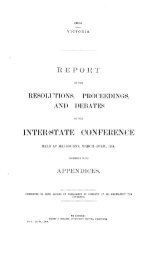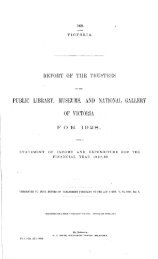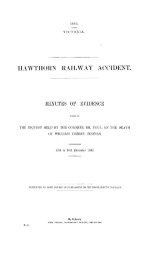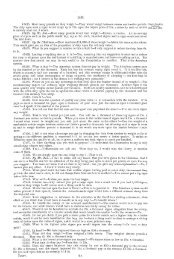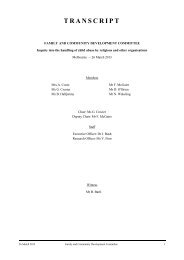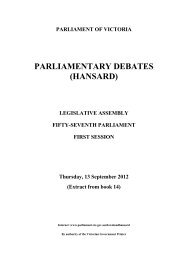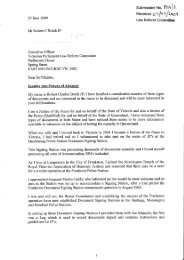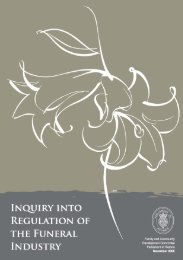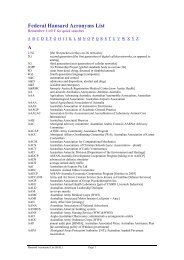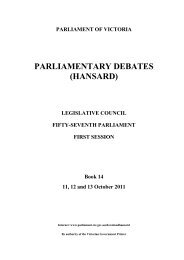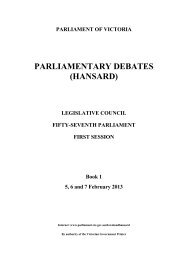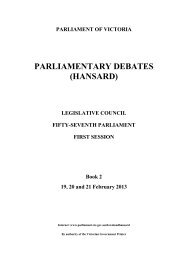Book 8 - Parliament of Victoria
Book 8 - Parliament of Victoria
Book 8 - Parliament of Victoria
You also want an ePaper? Increase the reach of your titles
YUMPU automatically turns print PDFs into web optimized ePapers that Google loves.
BUDGET PAPERS 2011–12<br />
Tuesday, 31 May 2011 COUNCIL 1579<br />
vacuum. There is a real risk <strong>of</strong> ad hoc decisions. We<br />
have seen ad hoc decisions and ad hoc development<br />
and the impact that that is likely to have on<br />
communities.<br />
We have seen a number <strong>of</strong> announcements by the<br />
government in relation to Fishermans Bend but also a<br />
number <strong>of</strong> other announcements concerning the<br />
opening up <strong>of</strong> growth areas <strong>of</strong> land for housing,<br />
whether that is in Moe, Ballarat or Werribee. Yet on not<br />
one occasion has there been any commitment, either in<br />
this budget or elsewhere, to the sort <strong>of</strong> infrastructure<br />
that you need to deliver a well-planned and a<br />
well-thought-through community. The risk is that you<br />
therefore have no plan and no financial investment to<br />
make sure that those communities thrive. That is a real<br />
concern and deficiency in this budget.<br />
As I said at the start, the budget is a bit underwhelming.<br />
There is a risk for those communities that are not being<br />
planned or provided for in terms <strong>of</strong> infrastructure and in<br />
terms <strong>of</strong> buses. I note that there is no funding for<br />
additional buses. But there is a greater challenge which<br />
this government and this budget have failed to live up<br />
to or understand — that is, how do you maintain<br />
Melbourne’s vitality; how do you maintain diversity;<br />
how do you maintain the attractiveness <strong>of</strong> this city as a<br />
living space, including the suburbs and the regions; and<br />
how do you ensure it is a place that attracts innovation,<br />
that attracts and keeps the best and brightest in the<br />
absence <strong>of</strong> mineral wealth, but also in circumstances<br />
where in many ways that mineral wealth is acting as a<br />
bit <strong>of</strong> a drag on the <strong>Victoria</strong>n economy? It is a drag<br />
because <strong>of</strong> the increases in interest rates and because <strong>of</strong><br />
the high Australian dollar.<br />
In the face <strong>of</strong> those challenges you would have thought<br />
that it was imperative, that alarm bells would be ringing<br />
and that this government would forge a way forward<br />
and make sure we have the sorts <strong>of</strong> policies that would<br />
deliver a budget that ensured that <strong>Victoria</strong> stayed<br />
competitive. The interesting contrast is with New South<br />
Wales, where there is a new Premier who, as he says, is<br />
very much committed to making that state no. 1 again.<br />
It is an interesting contrast between that sort <strong>of</strong> drive<br />
and ambition and the very lacklustre approach we have<br />
seen in this budget — a budget which I think risks<br />
everything and really delivers nothing.<br />
Mr DRUM (Northern <strong>Victoria</strong>) — It is a great<br />
pleasure to have the opportunity to rise to talk about the<br />
2011 state budget, which was handed down earlier this<br />
month by the Treasurer, Kim Wells. I want to<br />
congratulate him on the work he has done. This budget<br />
will be seen by most observers as the first <strong>of</strong> many<br />
responsible budgets handed down by the Baillieu-Ryan<br />
government. I am very proud to use the term<br />
‘responsible’, because certainly the group we took over<br />
from acted in a manner that was anything but<br />
responsible, with a whole range <strong>of</strong> promises and<br />
overblown projects. The former government figured it<br />
could cover up its inadequacies with an overblown<br />
press unit and spin that went on and on. That became a<br />
hallmark <strong>of</strong> the Bracks and Brumby governments. They<br />
said, ‘We will govern the way we want to govern, and<br />
we will use the media and spin to weasel our way out <strong>of</strong><br />
the problems we create’.<br />
This budget takes the interests and the concerns <strong>of</strong> the<br />
taxpayers as the concerns <strong>of</strong> the premium people <strong>of</strong><br />
interest. In forming this year’s budget we have looked<br />
at the people <strong>of</strong> <strong>Victoria</strong> as the people who have given<br />
us the opportunity to form the budget in the first place<br />
and to use revenue as its base. We have used them as<br />
the pillar from which we are now going to look at how<br />
best to disperse the money back to the community. That<br />
is something the previous government failed to do in its<br />
period in <strong>of</strong>fice.<br />
I want to talk a little about the Regional Growth Fund,<br />
which is a project worth $1 billion over eight years. It is<br />
the flagship for regional development in the budget. We<br />
took this project and this policy to the election. Six to<br />
eight months out from the election we signalled the<br />
quantum <strong>of</strong> money we were prepared to put on the table<br />
for regional development. Did the former government<br />
try to match it? No, it did not. It did not even look at the<br />
amount <strong>of</strong> money we were prepared to put into regional<br />
development, which was approximately two and a half<br />
times the amount <strong>of</strong> money that the previous<br />
government had on the table for regional development<br />
with its Regional Infrastructure Development Fund<br />
(RIDF).<br />
Over and above the $160 million that Mr Ramsay<br />
spoke about for our 40 smallest councils, there is an<br />
extra $1 million for each <strong>of</strong> our small councils. That is<br />
over and above the $20 million for our aviation fund,<br />
which the previous government used to sneak inside its<br />
RIDF, and over above the Local Roads to Markets<br />
money, which again the previous government used to<br />
sneak inside the RIDF. All <strong>of</strong> our aviation funding and<br />
our local roads funding is outside this government’s<br />
Regional Growth Fund. However — —<br />
Mr Barber — What about the rail container<br />
subsidy?<br />
Mr DRUM — The rail container subsidy?<br />
Mr Barber, talk to me about that. In essence, we have<br />
$120 million a year going into regional development.



